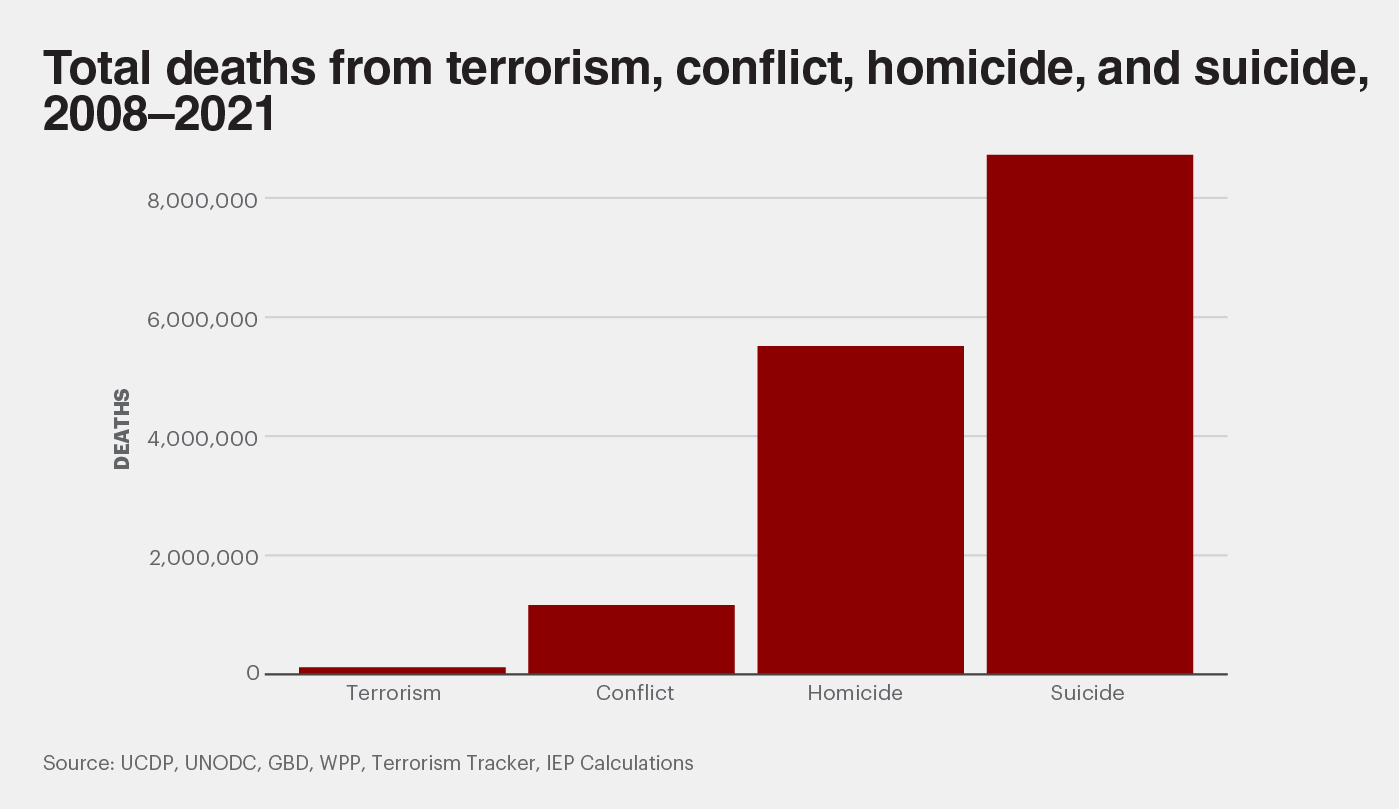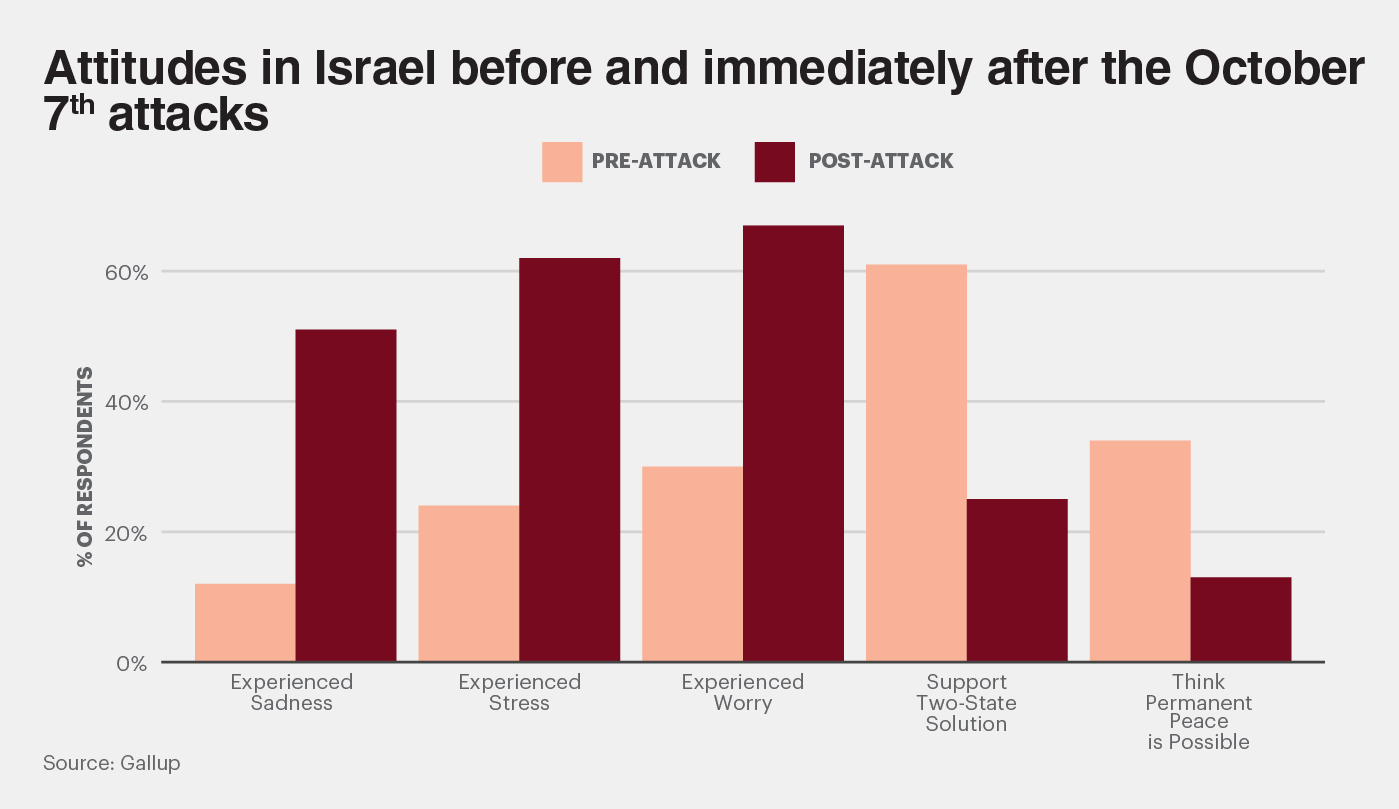Terrorism kills far fewer people than other forms of violence. Armed conflict kills nine times as many people as terrorism, and homicide kills over 45 times as many people, reports the Global Terrorism Index 2024 (GTI), produced by the Institute for Economics & Peace. However, terrorism is unique as its unpredictability and high casualty rates lead to significant emotional and psychological impacts, which can in turn lead to significant social and geopolitical repercussions.

Terrorism is a unique threat not because it kills the most people, but because it has the greatest potential psychological and social impact. This impact is felt not only by the victims of terrorist attacks, but also by their family, emergency response workers and the broader community. A review of studies on terrorism and psychological impact shows elevated levels of post traumatic stress disorder (PTSD), major depressive disorder (MDD) and anxiety disorders in the population of the immediate areas of terrorist attacks. This can be manifested through symptoms such as low mood, intrusive memories, nightmares, hypervigilance, and avoidance behaviour.
A study on the areas affected by the 2011 Norwegian terrorist attacks found that health services saw an increase in mental health-related visits immediately after the attacks, demonstrating a need for mental health primary care capacity in terrorism-affected areas. The most significant psychological effects are seen in individuals present during attacks or people with close ties to victims, with these individuals exhibiting PTSD at rates of 30-40 per cent according to a 2007 study. Effects can also be felt throughout broader society, changing public sentiment around key issues. For example, after the October 7th attacks by Hamas on Israel, support for the peace process and two-state solution collapsed, and rates of worry, sadness, and stress all more than doubled.

Terrorist attacks targeted at specific social, ethnic or religious demographics can lead these groups to experience disproportionate levels of psychological stress.Using IEP’s Pillars of Positive Peace gives a greater understanding of the factors that inform terrorism. The strongest correlation between Positive Peace and terrorism is in the Acceptance of the Rights of Others Pillar. Countries that enforce formal laws that guarantee basic human rights and freedoms and also have informal social and cultural norms that promote the rights of others, are more likely to experience less impact from terrorism.
Responding to the impact of ideological terrorism aimed at religious groups, Founder and Executive Chairman of IEP Steve Killelea says that “[terrorists] are sending a message to all other people of those faiths, that they are targets as well and that’s what puts the terror into terrorism.” The psychological effect of this targeting can lead to increases in intolerance and bigotry in public discourse, harming the Acceptance for the rights of others pillar.
Social media networks and the speed of global information proliferation has also contributed to terrorism’s wider social and psychological impact beyond the immediate affected region. A study on university participants in Pakistan found that exposure to information related to terrorism through social media led to increased depressive symptoms and life dissatisfaction. Despite this, respondents who perceived a level of online support were less likely to report negative effects. Sensationalist media coverage of terrorism can lead to public spread of misinformation, which threatens to aggravate societal division. Chief Research Officer for IEP Thomas Morgan emphasises the importance of caution in terrorism discourse.
“Politicians and people with a high public profile should be careful of what they say regardless of the increasing risk of terrorism,” Morgan said. “It’s always good to promote strong civil discourse and a strong civil society.”
“Politicians and people with a high public profile should be careful of what they say.”
Academic literature on the psychological impacts of terrorism, while extensive, is generally focused on Western countries, with a significant proportion centred around the September 11th, 2001 attack in the US. The GTI 2024 found that Sub-Saharan Africa, the Middle East and South Asia accounted for 94 per cent of deaths from terrorism in 2023, emphasising the need for more extensive research on the psychological impacts of terrorism in non-Western nations. The GTI also reports that the drivers of terrorism vary in strength between highly economically developed and developing countries. In the OECD, internal conflict is only weakly linked to terrorism, whilst outside of the OECD it is the strongest predictor.
Terrorism’s psychological toll is felt beyond the statistics of death and injury, significantly amplifying its societal harm. The extent of the emotional and psychological damage inflicted emphasises the need for effective social interventions for those affected by terrorist attacks and great care in managing public discourse to maintain societal cohesion.
Sources